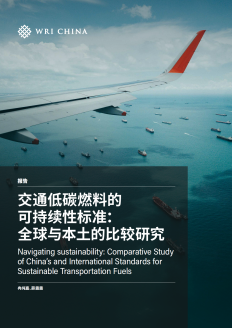Navigating sustainability: Comparative Study of China’s and International Standards for Sustainable Transportation Fuels
Promoting sustainable alternative fuels is a key strategy for decarbonizing the transportation sector. However, current policies—both domestic and international—differ in their definitions and sustainability criteria. This study compares the sustainability requirements, greenhouse gas (GHG) emission intensities, and accounting methodologies for sustainable transportation fuels across ICAO, IMO, the EU, the United States, and China. It also estimates the GHG emission intensity of typical fuels produced in China, providing insights to support the development of a China-specific standards system for sustainable transportation fuels.
Promoting sustainable alternative fuels is widely regarded as a key strategy for achieving emission reduction targets in the transportation sector. Defining sustainable alternative fuels through clear and robust standards is critical. These standards form the basis for designing effective policy frameworks and guiding industry investment. In recent years, ICAO, IMO, the EU, the United States, and China have all introduced policies to support the development of sustainable alternative fuels. These policies are beginning to have a profound impact on China’s relevant industries. However, the definitions and sustainability criteria for alternative fuels vary considerably across these jurisdictions. This study draws on global experience to address two key research questions:
1. What are the sustainability criteria for transportation alternative fuels among international organizations, the EU, and the US? How do they differ from China’s standards? What certification mechanisms exist globally for ensuring the sustainability of alternative fuels?
2. How do the EU, the US, ICAO, and IMO establish GHG emission intensity requirements and accounting methods for transportation alternative fuels? Does the lifecycle carbon emission intensity of typical sustainable alternative fuels produced in China comply with domestic and international requirements?
The findings indicate that:
- China needs to strengthen its existing standards for sustainable aviation fuels (SAF) and develop dedicated standards for sustainable maritime fuels.
- China has made notable progress by prohibiting the use of food crops in aviation biofuel production. However, this restriction should be extended to shipping biofuels. In addition, China should enhance its requirements for agricultural and forestry residues by prohibiting sourcing from high-carbon ecosystems and setting scientifically grounded residue retention thresholds to protect soil health and carbon stocks.
- China should align its biofuel GHG accounting methodologies with international best practices. This includes applying rigorous methods for accounting indirect land-use change emissions, assessing displacement effects, and incorporating avoided emissions.
- For synthetic fuel accounting, China should develop requirements for sourcing of CO2, hydrogen, and electricity that align with industrial development needs and decarbonization goals. Given the significant impact of electricity emissions factors, China needs to establish monthly or hourly electricity carbon footprint factors and ensure their regular updates.
